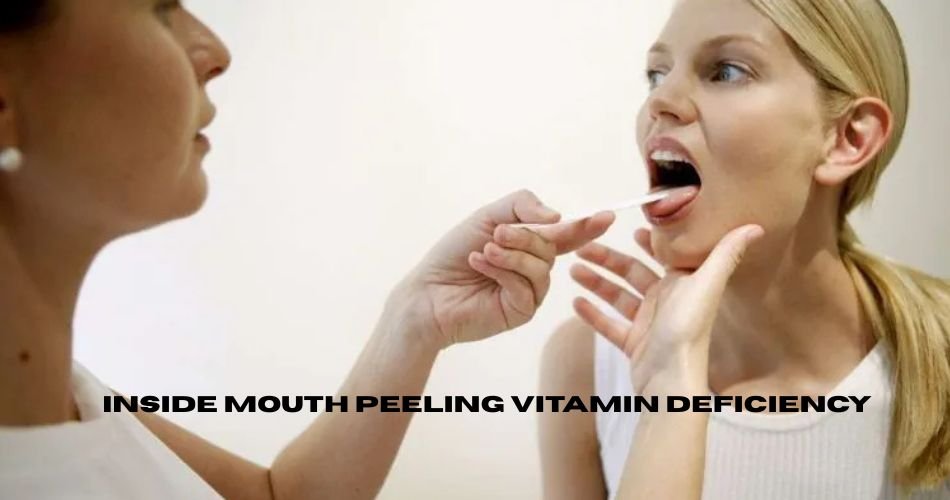Inside mouth peeling refers to the shedding or flaking of the mucous membrane lining the inside of your mouth, including the cheeks, lips, and sometimes the tongue. While it might sound like a minor issue, this symptom can be quite uncomfortable and may even interfere with eating, drinking, and speaking. Mouth peeling can happen occasionally for many reasons, but when it becomes persistent, it often points to an underlying health problem. One common but frequently overlooked cause of this peeling is vitamin deficiency. Vitamins play a critical role in maintaining healthy tissues inside your mouth, and their absence can lead to a breakdown of the delicate mucous membranes.
Common Causes of Inside Mouth Peeling Vitamin Deficiency
Peeling inside the mouth isn’t always caused by vitamin deficiency alone. Other common factors include irritants like spicy or acidic foods, allergic reactions to dental products or certain foods, infections such as candidiasis, or mechanical trauma like accidentally biting the inside of your cheek. Additionally, conditions such as lichen planus, pemphigus vulgaris, or even chronic dryness can contribute to the peeling of the mouth lining. However, when these causes are ruled out, and peeling persists, vitamin deficiency should be strongly considered, especially in individuals with poor nutrition, restrictive diets, or absorption problems.
The Role of Vitamins in Oral Health
Vitamins are indispensable for keeping the oral mucosa healthy. They help with the maintenance and repair of tissue, protect against infections, and support overall immune function. Some of the most important vitamins for oral health include the B-complex vitamins, vitamin C, and vitamin A. These vitamins aid in collagen synthesis, cell regeneration, and maintaining the moisture and resilience of the mucous membranes. Without adequate intake or absorption of these nutrients, the tissues inside the mouth become fragile, inflamed, and susceptible to damage and peeling.
Vitamin B Complex Deficiency and Mouth Peeling
Vitamin B complex, which includes riboflavin (B2), niacin (B3), pyridoxine (B6), and cobalamin (B12), plays a central role in maintaining the health of the mouth’s lining. Deficiency in these vitamins often manifests as symptoms like sore or burning tongue, cracked lips, and peeling or flaking skin inside the mouth. For example, riboflavin deficiency can cause angular stomatitis, a painful condition where the corners of the mouth crack and peel. Vitamin B12 deficiency, common in vegetarians and those with absorption issues, can cause glossitis and painful mouth sores. These B vitamins are essential for red blood cell production and neurological function, so their deficiency often brings additional systemic symptoms such as fatigue and weakness alongside oral problems.
Vitamin C Deficiency and Its Impact on Oral Mucosa
Vitamin C is well-known for its role in immune support and wound healing, mainly by aiding collagen formation, which is vital for healthy connective tissue. Without enough vitamin C, the tissues inside the mouth weaken and can start to peel or bleed easily. Severe vitamin C deficiency leads to scurvy, a condition historically associated with sailors but still seen today in malnourished populations. Scurvy causes swollen, bleeding gums and loosening of teeth, but early signs can include peeling of the oral mucosa. Because vitamin C is water-soluble and not stored in large amounts, a consistent dietary intake through fresh fruits and vegetables is necessary to prevent deficiency.
Vitamin A Deficiency and Oral Health
Vitamin A supports the maintenance and repair of mucous membranes and epithelial tissues. A deficiency, although less common in developed countries, can cause dryness, scaling, and peeling of the mucosal lining inside the mouth. Additionally, vitamin A plays a role in immune function, so its lack can make the mouth more vulnerable to infections that exacerbate peeling. Individuals with poor diet or fat absorption issues may be at risk, as vitamin A is fat-soluble and requires proper digestion of fats for absorption.
Other Nutritional Deficiencies Affecting Mouth Peeling
Beyond vitamins A, B, and C, deficiencies in other micronutrients such as iron, zinc, and folate can also contribute to oral health problems including mouth peeling. Iron deficiency anemia is often accompanied by a sore, inflamed tongue and mucosal changes. Zinc and folate play important roles in cell division and immune health, so their deficiency can slow the healing of oral tissues, leading to persistent peeling and soreness.
Symptoms and Signs of Mouth Peeling Caused by Vitamin Deficiency
Peeling inside the mouth caused by vitamin deficiency generally appears as flaky or sloughing patches on the inner cheeks, tongue, or lips. These areas may be red, tender, and sometimes bleed if irritated. Often, the peeling is accompanied by other symptoms such as burning sensations, soreness, or dryness. In some cases, painful ulcers or cracks may develop. These signs can affect eating, speaking, and overall comfort. Because vitamin deficiencies impact the whole body, other signs such as fatigue, irritability, skin changes, and weakened immunity may also be present.
Diagnosing Vitamin Deficiency as the Cause of Mouth Peeling
If you have persistent mouth peeling, it’s important to consult a healthcare professional who can evaluate your symptoms in context. Diagnosis often starts with a detailed medical and dietary history to identify risk factors for vitamin deficiency. The doctor will also perform a thorough examination of your mouth and other physical signs. Blood tests are the most reliable way to confirm vitamin deficiencies, measuring levels of vitamins B12, B2, C, folate, and iron among others. Identifying the root cause of the deficiency is also crucial, as absorption problems or underlying illnesses may need to be addressed.
Treatment of Inside Mouth Peeling Due to Vitamin Deficiency
The cornerstone of treating mouth peeling from vitamin deficiency is correcting the nutritional gap. This often involves both dietary changes and supplementation. A diet rich in fresh fruits, vegetables, whole grains, lean meats, dairy products, and nuts can replenish most vitamins naturally. Vitamin supplements may be prescribed for more severe deficiencies or when dietary changes alone are insufficient. Supplementation usually results in noticeable improvement within weeks, though complete healing may take longer. Alongside nutritional therapy, maintaining excellent oral hygiene, avoiding irritants like spicy foods or harsh dental products, and staying hydrated can promote healing and reduce discomfort.
Dietary Adjustments to Restore Oral Health
Adding nutrient-dense foods such as citrus fruits, leafy greens, nuts, eggs, and lean meats can rapidly improve vitamin levels. For example, oranges and strawberries provide vitamin C, spinach and liver are great sources of B vitamins and iron, and carrots and sweet potatoes are rich in vitamin A precursors. People at risk of deficiencies—such as vegans, older adults, or those with digestive disorders—should pay special attention to their diet or consult a dietitian.
Supplements: When and How to Use Them
When dietary intake isn’t enough or if the deficiency is severe, supplements can quickly restore vitamin levels. Commonly used are vitamin B complex tablets, vitamin C capsules, and multivitamins that include zinc and folate. It is best to take supplements under medical supervision to ensure the correct dose and avoid possible side effects or interactions.
Home Remedies and Oral Care Tips
To soothe peeling and support healing, avoid irritants such as tobacco, alcohol, and spicy or acidic foods. Gentle brushing with a soft toothbrush, rinsing with mild salt water, and staying well hydrated can help reduce irritation. Using moisturizing oral gels recommended by a dentist may also provide relief.
Preventing Mouth Peeling Through Proper Nutrition and Lifestyle
Prevention of inside mouth peeling hinges on maintaining a balanced and nutrient-rich diet alongside good oral hygiene. Regular meals with a variety of foods ensure steady vitamin intake, while avoiding habits like smoking and excessive alcohol protects the mucous membranes. Routine dental visits help catch problems early. Also, managing stress and getting enough sleep support immune function and tissue repair.
When to Seek Medical Advice
If peeling inside your mouth persists for more than two weeks, worsens, or is accompanied by severe pain, bleeding, or systemic symptoms like fatigue or weight loss, it’s important to seek medical attention. Early diagnosis can prevent complications and improve treatment outcomes. In some cases, mouth peeling may signal more serious conditions requiring specialized care.
Conclusion
Peeling inside the mouth is more than just an irritating symptom, it can be a sign that your body is lacking essential vitamins necessary for maintaining healthy oral tissues. Vitamins B, C, and A are particularly crucial in preventing and healing mucosal damage. By understanding the connection between nutrition and oral health, you can take proactive steps to nourish your body and protect your mouth. Whether through dietary improvements or supplements, addressing vitamin deficiency can restore comfort, appearance, and function to your mouth’s delicate lining. Don’t ignore persistent mouth peeling, it might be your body’s way of asking for help.






